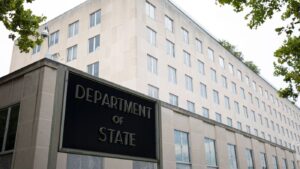The Trump Administration’s Tension with Harvard: A Tax-Exempt Status Threat
In a developing confrontation, President Trump has intensified his dispute with Harvard University by suggesting the removal of its tax-exempt status. This announcement follows a significant cut of over $2 billion in federal funding after Harvard’s resistance to government-imposed demands.
The contentious exchange began when the Trump administration issued a list of directives to Harvard, demanding oversight of academic activities and restrictions on the influence of students and faculty. Harvard’s president rejected these terms, labeling them as unlawful attempts to control, “what private universities can teach, whom they can admit and hire, and which areas of study and inquiry they can pursue.”
The president expressed his dissatisfaction on social media, stating that Harvard might need to be taxed as a political entity if it continues to support what he described as “political, ideological and terrorist-inspired/supporting sickness.” The stakes are high, with approximately $9 billion in federal grants for Harvard at risk.
Legal actions have already begun in response to the administration’s demands. A lawsuit, initiated by Harvard’s faculty alongside the American Association of University Professors, challenges the conditions tied to the withholding of funds.
Elissa Nadworny of NPR reports that college administrators are apprehensive about the administration’s actions extending beyond grant cuts. Ted Mitchell, President of the American Council on Education, remarked, “The catalog of horrors is a thick one, and there are plenty of things that the administration can seek to do that would throw institutions off kilter, and tax-exempt status is certainly one of them.”
Most educational institutions, including Harvard with its substantial $50 billion endowment, benefit from nonprofit status. This status groups them with charities, religious bodies, and some political organizations, allowing them to accumulate significant endowments. However, the authority to revoke such status is complex, and while President Trump may not have direct power, he could influence the IRS in exceptional cases. Currently, there’s legislation in Congress that could expand presidential and Treasury Secretary powers over these exemptions.
Looking back, a similar precedent exists with Bob Jones University, which lost its tax-exempt status due to racially discriminatory policies, a decision that was upheld by the Supreme Court in the early 1980s. The university only regained its tax status years after abandoning the policies.
The Trump administration justifies these actions as part of its effort to combat antisemitism on campuses. Yet, targeting perceived liberal institutions has been a long-standing agenda for Trump. At a 2023 event in Florida, he declared, “After 50 years of leftist domination of the universities, I will take bold action to reclaim our colleges from the communist left.”
In recent weeks, the administration has annulled about $11 billion in federal grants to several elite universities, signaling that President Trump remains committed to this course of action.






